|
Digital industry steps up sustainability standards
|
This month I am excited to report that today, Mozilla are launching a brand new sustainability magazine, Branch. I was honored to have been asked to write a feature in the first issue.
I am also very happy to report on something that I have been hoping would come for a long time. Given our specialism in WordPress here at Wholegrain Digital, it has pained me to see Automattic – the company that runs the commercial arm of WordPress – being silent on the issue of digital sustainability for so long, but they are finally taking action. Hoorah!
As always, I’m interested in your thoughts. Do hit reply to this email, or reach out on social media @eatwholegrain to start a conversation!
– Tom Greenwood
|
|
|
Top picks from the green web
|
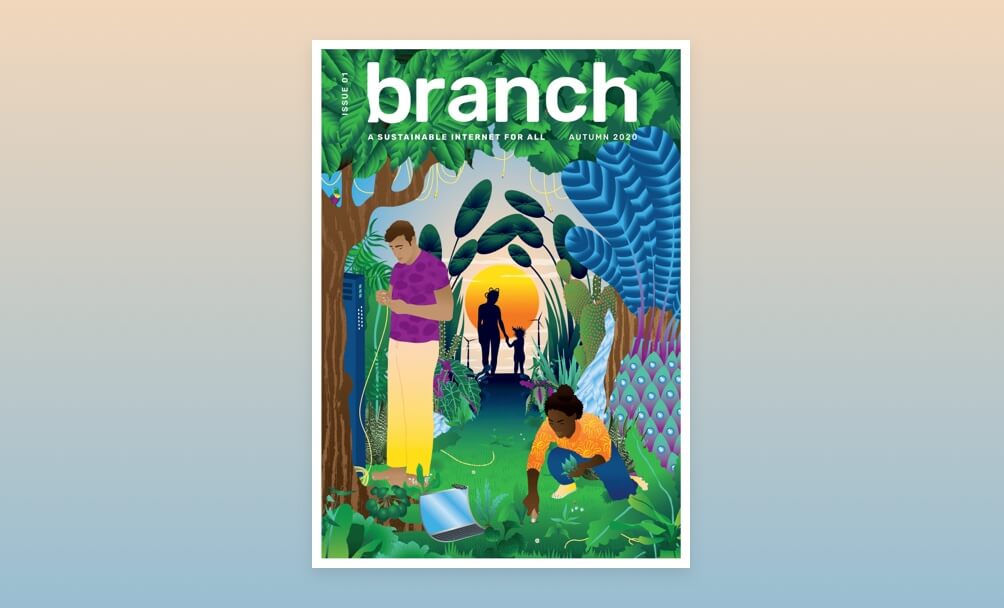
Mozilla launches web sustainability magazine
|
Mozilla, a long time leader in the ethical aspects of digital, has launched a brand new online sustainability magazine, Branch. Mozilla announced this magazine on their wiki back in the spring, following the outbreak of the current pandemic.
Supported by a partnership that includes the European Institute of Innovation & Technology (EIT)’s Climate KIC, Climate Action Tech and the Mozilla Foundation, this new online magazine is a mix of long form writing, short profile pieces and artwork designed to discuss a sustainable internet and the support and inspire initiatives that could make this vision a reality. They have also introduced a great design feature, whereby the design detail changes to reflect the carbon intensity of your local electricity while viewing the website!
I wrote a piece for the first issue, reflecting on my learning’s over 13 years of trying to run a sustainable digital agency. It’s now live alongside great articles from people from various sectors, all united in the desire, and motivation, to move towards a more sustainable and fair internet for all.
|
|
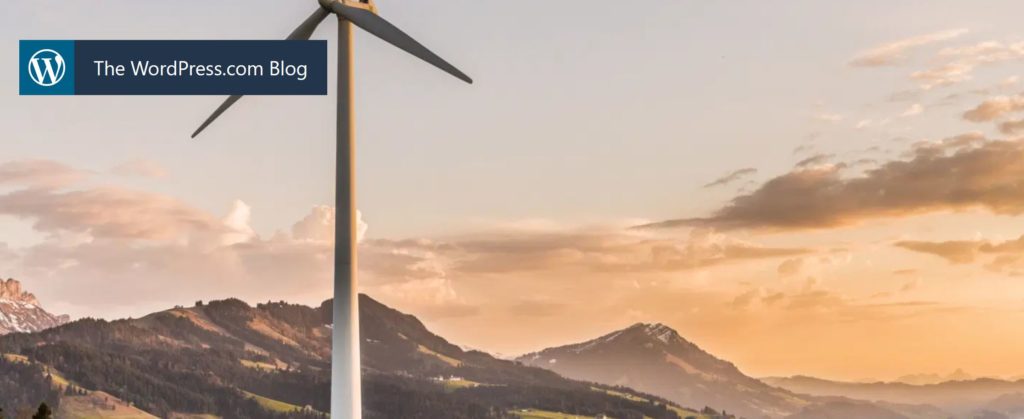
WordPress.com owner steps towards sustainability
|
Automattic, the company that runs WordPress.com, recently shared the steps they are taking towards becoming a more sustainable business. Following the creation of a new internal working group for sustainability, this year the company has started to measure its environmental impact, in order that they can take action to reduce it.
In their blog, they share the full details of how they are now reducing and offsetting their data center emissions, buying offsets from Simoshi, which is a UN Gold Standard offset platform. Automattic are very transparent that this offsetting is not the ideal, and are clear that this is a short term solution, and they remain committed to reducing their emissions in the long-term.
I must say that this is somewhat overdue but it is fantastic to see that the passion of Automattic employees is finally being recognised and turning into real action. WordPress.com operates at such huge scale that any sustainability initiatives (or lack of) make a big difference, so this is big news for the sustainability of the web. I hope that it also inspires action in the rest of the industry.
|
|
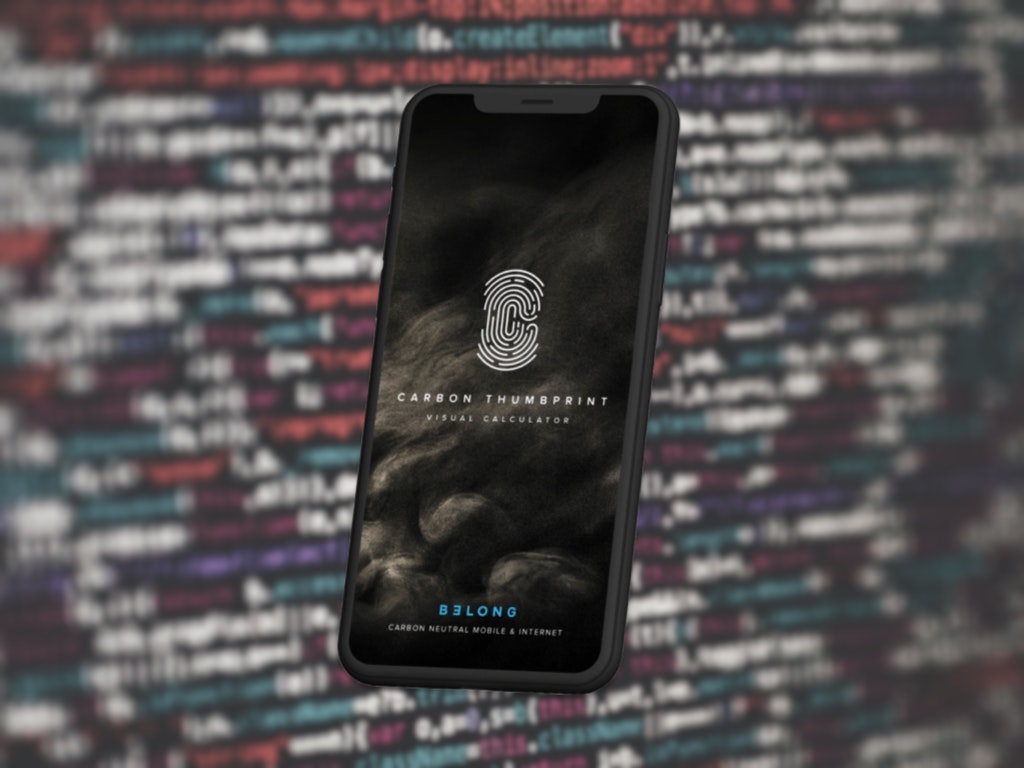
What's your ‘Carbon Thumbprint’? - New Australian App To Track Mobile Data Emissions
|
Belong, the first Australian broadband and mobile data provider in Australia to achieve carbon neutral accreditation, has recently launched a new app designed to help users track what they are calling our ‘carbon thumbprint’.
Developed by Belong, The Carbon Thumbprint App is an augmented reality platform that uses data modelling to calculate the size and effect of each individual’s carbon emissions based on their mobile usage. The aim of this app is to encourage people to become more mindful of their mobile usage, and try to minimise the impact of their everyday choices.
I think its a good step in raising awareness of the environmental impact of digital, and great to see that they have shared their methodology so openly.
|
|
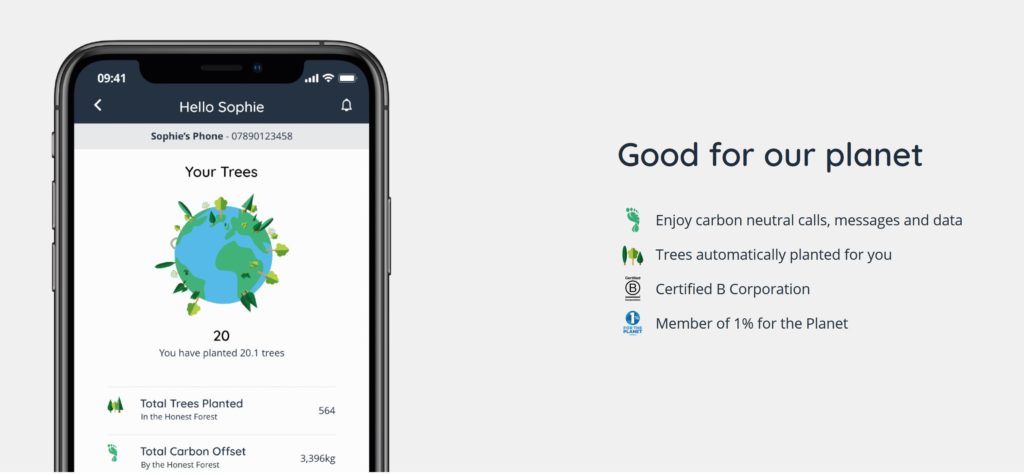
Honest claims to be the world's first carbon neutral mobile network
|
Here in the UK, fellow B Corp Honest mobile recently launched what they claim is the world’s first carbon neutral mobile network. It’s interesting that others make similar claims. For example, Belong, the mobile provider in the feature above, claim to be Australia’s first carbon neutral mobile network. Then there is EcoTalk who have been around for over 10 years using verified renewable energy, and using the money from their customer’s bills to rewild the UK. Plus, Vodafone recently announced that its European network will be powered entirely by renewable electricity by 2021 (as we shared in issue 11). I am not sure who can really claim first prize here, but its great to see that there is competition to be the most environmentally friendly mobile provider!
Anyway, Honest mobile is committing 1% of its revenue to reforestation, saying that this emissions offsetting means they can provide carbon-neutral calls, texts and data. When people join Honest, they can download the company app, which shows them how many trees have been planted on their behalf.
|
|
|
The Game Theory of Carbon
|
This recent episode of Seth Godin’s podcast, Akimbo, on ‘The Game Theory of Carbon’, was a fascinating look at how the way we shape incentives in society – such as the way the global aviation industry works, for example – drives business and technology, to either pollute or not pollute. Furthermore, it even drives whether or not governments are incentivised to create and enforce environmental laws. Seth posits that we now have a new worldwide challenge (to reduce carbon consumption) but, unlike the aviation industry, we don’t have the ‘game theory’ in place to encourage universal worldwide adoption and solve this challenge. I’d argue that to some extent this is true in the digital sector, where the rules of the game don’t create many natural incentives for web teams to prioritise efficiency, although that is changing as speed becomes a bigger factor in SEO and user experience.
If the rules of the game incentivise polluting, then pollute we will. So it raises a big question, how can the rules of the game be changed at a global level in a way that gives not just businesses, but also governments, an incentive to create solutions to climate change.
|
|
|
|
|
The best bridge between despair and hope is a good night’s sleep.
|
Matthew Walker
|
|
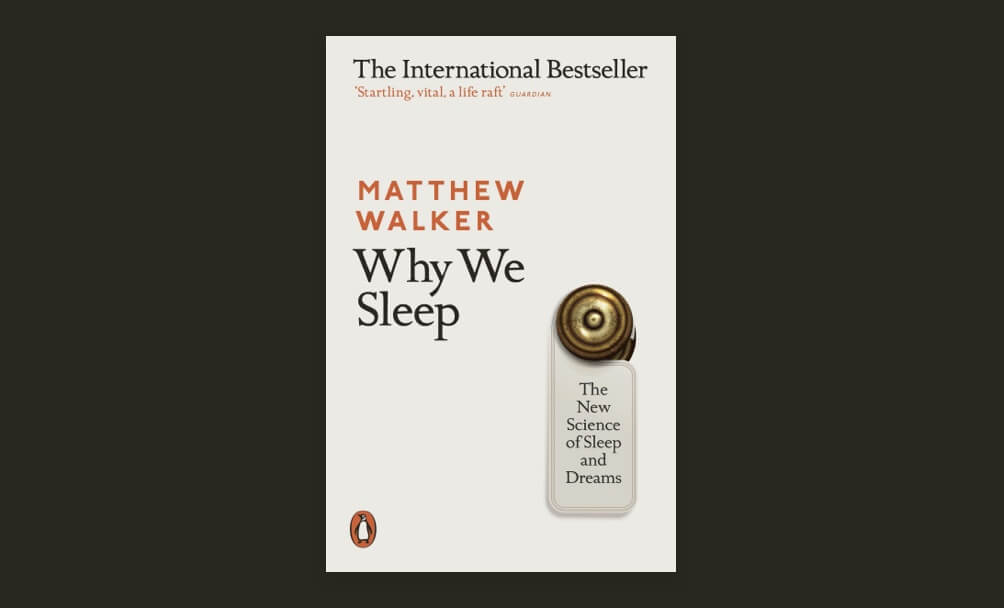
Why We Sleep by Matthew Walker
|
Did you know, when sleeping in a new environment (such as a hotel room), only half of your brain goes to sleep? The other half is actively minding your unfamiliar surroundings.
Why We Sleep by Matthew Walker is packed to the brim with these golden insights into the science of sleep. Supported by twenty years of ground-breaking research, Walker’s engaging account of why we need forty winks will leave you wanting more – both of the book and sleep itself.
But what shocked me most was the detrimental effect technology is having on our ability to sleep – and therefore on our productivity. Everything from the blue light in our handheld devices to the fact that we end our days in the brightest room in the house – the bathroom – technology is confusing our natural body clock and depriving our society of sleep. Walker takes this one step further at the end of the book and explores the sobering impact that insufficient sleep has at a societal level, in education, healthcare and business.
So now we have a few more reasons to switch off and power down early. You’ll not only be saving the environment – you’ll be saving your sleep.
–Nick Hart, Project Manager at Wholegrain Digital
|
|
|
|
|
Quick links from our team & friends
|
-
I spoke to PublishPress this month, about building healthy, sustainable businesses, and shared some tips on quick ways you can green your website.
-
Gerry McGovern is running the Digital Earth Experience webinar on November 12th. He asks “How do we embrace circular economy and degrowth thinking in digital design?”
-
This month I took part in Al Gore’s 24 hours of Reality to raise awareness of everyday choices that we can take to help tackle climate change.
The videos are now on YouTube, with many great talks on a range of topics, including some on digital sustainability.
Part 1 includes Microsoft’s Asim Hussain talking about Sustainable tech choices and Part 2 includes Neil Clark from Manifesto talking about The environmental impact of the digital industry, as well as me talking about Eating Sh** Tomatoes 😉
-
Ecosia’s Pieter van Midwoud asks “Does carbon offsetting work? Only if you get it right“
|
|
|